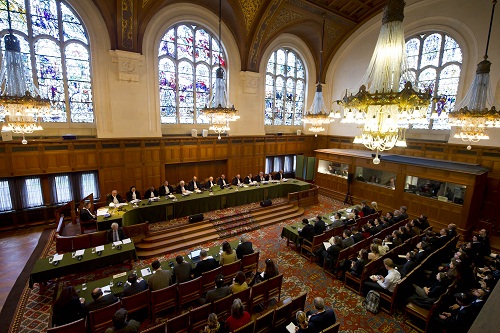
(above) Bolivia representatives are in the Hague to present case to ICJ. Photo via the International Court of Justice.
Bolivia to finally bring Chilean dispute to Hague this Wednesday
April 22, 2013 - Santiago Times
Written by Charlotte Karrlsson-Willis
After years of threats and demonstrations, Bolivia is now officially presenting its maritime case against Chile at the ICJ.
Bolivia, an officially landlocked nation since 1904, is hoping to reach the sea once again by suing Chile at the International Court of Justice (ICJ) for the land it lost in the War of the Pacific.
At the center of the case is almost 250 miles of coastline and over 74,000 square miles of land, currently part of the Atacama Region of Chile. Long disputed between Chile and Bolivia, Chile took full claim to the territory through the War of the Pacific (1879-1883), and the ensuing Treaty of Peace and Friendship that officially established the borders and was signed in 1904.
Bolivian president Evo Morales has championed this cause for his country, but the fight to reclaim the lost coastline long predates his presidency. In 1964 Víctor Paz Estenssoro, then-president of Bolivia, severed diplomatic ties with Chile over access to the sea. Relations were reestablished in 1975 under the two countries' dictators, Gen. Hugo Banzer and Gen. Augusto Pinochet, only to be severed once again by Banzer in 1978 when negotiations over the disputed territory went nowhere.
Despite the easing of tensions between the two nations under Chilean Socialist Party (PS) Presidents Ricardo Lagos and later Michelle Bachelet, diplomatic relations are yet to be established again.
The maritime dispute has become so important to Bolivia's foreign relations and culture that the landlocked nation celebrates "Día del Mar" (Day of the Sea) every March. The day is marked by celebrations and speeches to remember their claim and continue the fight to gain back their former coastline.
The next steps
On Wednesday the Bolivian committee dedicated to this case and led by former president Eduardo Rodríguez Veltzé, will present its formal application to the court. The application will outline Bolivia's reasons for bringing the dispute forward, the facts of the case and an explanation of why the court has the jurisdiction to hear it.
In order for proceedings to move forward, however, Chile has to agree to submit to the ICJ and engage in the process. If Chile agrees to participate, both nations would be bound to comply with the ruling, as stipulated by their membership to the U.N.
Bolivia is hoping Chile will meet them at the Hague, as it did to a case brought by Peru over another maritime dispute. The Chile-Peru case, presented to the ICJ in 2008, concerns the sovereignty of offshore fishing waters. The proceedings in that case have concluded, and the parties are now waiting for a decision from the court.
By Charlotte Karrlsson-Willis (kwillis@santiagotimes.cl)